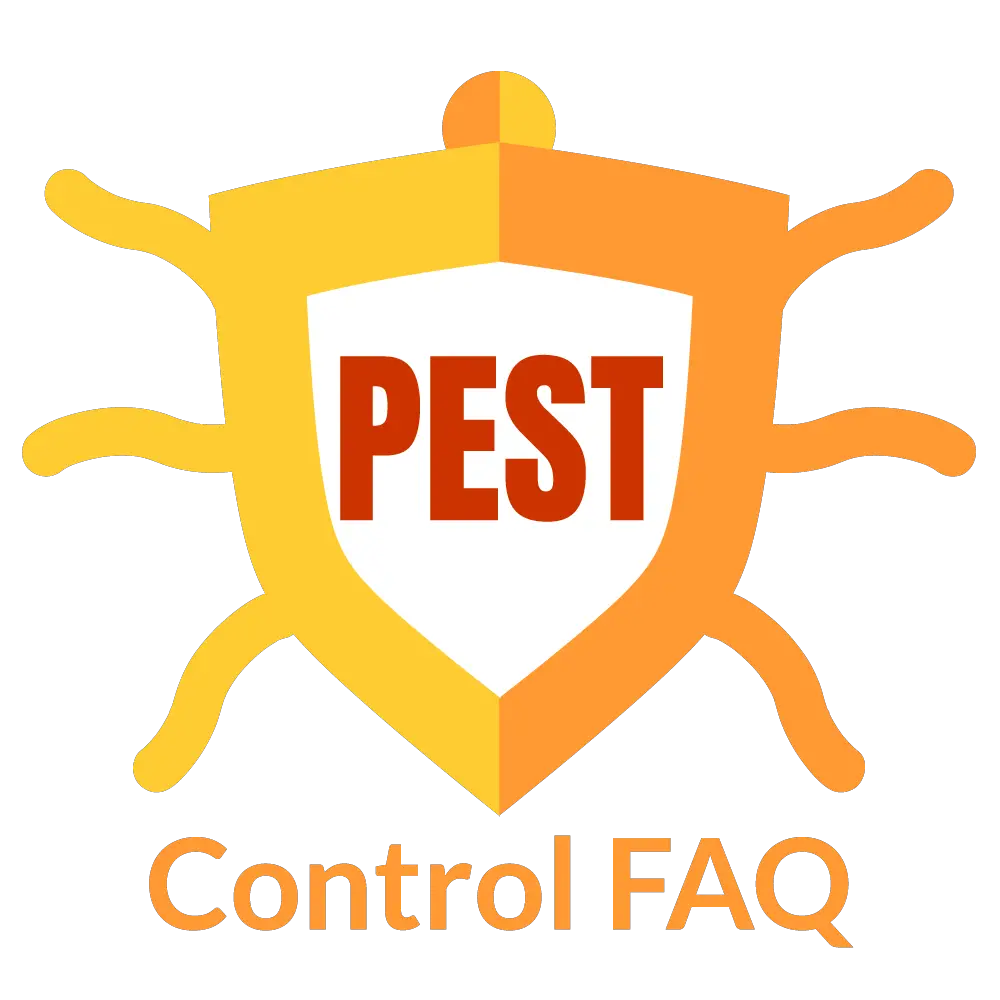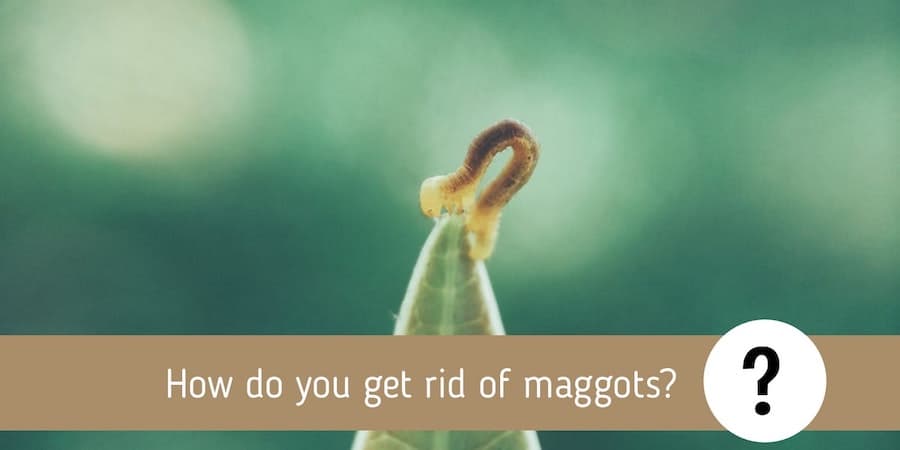Flies rapidly reproduce during hot weather which is probably why maggots would be an issue during these times. When they come in large numbers they start to become a problem, and may even cause infestation of live tissues which is dangerous to humans and animals within the vicinity.
So, how do you get rid of maggots and can pest control get rid of maggots? Peroxide in boiling water, dish soap and water, natural fly repellents, fly traps and pesticides have shown good results. Also, there are special pest control services that can get rid of maggots in your home. These professionals, equipped with specialized tools, will be able to tell you why the infestation started, how to treat it, and what to do to prevent future infestations.
In this article, you will learn more about maggots and the dangers of an infestation, how to get rid of maggots as well as the treatments that can be used to control their population.
Pest Control overview
By definition the term “pest control” is the overall management of any destructive species of insect or animal. Pest control professionals remove and prevent infestations from occurring in households, businesses, and other infrastructures.
With the help of specialized equipment and knowledge about the pests involved, they are able to protect the people as well as save their properties from infrastructural damage.
Maggots are quite common in areas with poor sanitation. Through the expertise of pest control professionals, homeowners will be able to exterminate these pests and learn how to prevent reoccurrence of the infestation.
What are Maggots?
Technically, the term “maggot” is not for technical use. Maggots are formally known as fly larvae and is often present after fly reproduction. An adult fly would lay eggs on rotting food or other similar material.
When the egg hatches and the larvae look for food, they would be able to access it easily. Adult flies make sure to lay their eggs where their children will thrive, and since maggots only eat dead or rotting tissue. Any form of discarded food or meat would be perfect for them.
Fly Life Cycle
In order to understand the process better, here is how maggots are formed:
- An adult female fly lives for about 28 days on average. During this time, she lays approximately 500 to 2,000 eggs.
- After just one day of laying her eggs, they hatch and maggots appear.
- The maggots are 3 to 9 millimeters long and are white in color.
- Maggots feed for 5 days and enter their pupal stage.
- It takes 14 to 36 days in total for the eggs to turn into flies.
Maggots work as nature’s natural recyclers. When animals die, and their bodies start to rot, maggots break down the decaying flesh of these dead animals. In a way, maggots are also important in our ecosystem.
In addition to this, medical maggots are utilized in debridement of necrotizing tissues. Doctors have found that since maggots only consume dead tissue, they would be excellent in helping patients heal faster.
Are Maggots Dangerous?
As we know, maggots only feast on putrid decaying flesh or vegetation. Which makes it seem completely harmless to humans. However, with the species evolving, scientists have segregated maggots into groups depending on their eating patterns.
You’d be surprised to know that there are maggots who eat live tissue as well. The term for when maggots start to eat live tissue is called myiasis, and this has been documented in various patients, especially those who frequent in hot climates.
Decayed Flesh Eating Maggots
These are the usual maggots you would probably see in the garbage or on rotting food. They simply consume the decayed tissue and follow through pupal stage without causing eminent harm to humans.
Live Flesh Eating Maggots
These maggots consume live flesh and frequent in temperate climate, poor sanitation and are often left untreated due to the fact that medical care is close to inaccessible.
Parasitic Maggots
A certain species of flies feed parasitically on live tissue as part of their cycled. They lay their eggs in damp clothing or soil, and as soon as the eggs come in contact with human skin, they hatch. The incidence of this type of maggot is quite rare.
Opportunistic Maggots
Flies will lay their eggs in places they know their offsprings will thrive. In the case of opportunistic maggots, the fly would’ve chosen to lay their eggs on decaying wounds. People with exposed wounds or gangrenous injuries may experience this if their wounds are not cleaned and kept well.
Some species of maggots even burrow further into the wound and start consuming internal live tissue.
Accidental Flesh Eating Maggots
Myiasis can happen by accident. In cases of very poor hygiene, maggots can grown in the urogenital areas, since flies are quite attracted to the smell of urine and feces. Other cases present in the mouth where contaminated food has been consumed and because of very poor dental hygiene, maggots started feed. Accidental myiasis is quite rare, there are only a handful of cases documented worldwide.
Ideally, maggots don’t cause direct harm but due to negligence on our end, these creatures have found a way to affect us negatively. When travelling you need to maintain good personal hygiene, avoid going barefoot, and watch what you eat.
What Would Cause Maggots to be in my Home?
Flies will frequent dirty, damp, and dark areas. If you have exposed garbage, you can be sure that there will be an infestation of maggots soon after. In order to prevent this from happening here are some tips you would need to follow:
Clean-Up Leftover Food
If you have food leftover from lunch, keep it covered or place it in the refrigerator. Exposing food sources will attract flies to lay their eggs. The same goes with pet food. Most pet owners will just top-off their pet’s bowls, what they didn’t know is that the food underneath has already become home to hundreds of fly larvae.
Clean Out Garbage Cans
This is one of the most neglected chore. After the garbage men have collected your trash, we don’t really dwell on washing out the bins. If cats, racoons, or other ferrell creatures get into your bins, they would have dropped some food and these may be left at the bottom of the bin to house maggots.
Seal Composts
If you do composts, you would need to seal them well. When flies have access to it, they will start laying their eggs and the maggots will start infesting your compost pile.
Clean Up After Your Pets
If you own a dog or practically any pet that defecates in the yard, you need to make sure that their feces is cleaned out and is disposed of properly. Flies are quite attracted to the smell of poop and will eventually house their young in them.
Keep Your Surroundings Clean
By maintaining a clean environment you can be sure that maggots will not find its way in your home. Check your home’s perimeter for any dead rodents, garbage, or spoiled food.
How do you get rid of maggots? What can kill maggots?
Now it’s a time to take a closer look how to get rid of maggots. Getting rid of the flies is just as important of getting rid of the maggots. Generally, there are always two major ways in getting rid of any pests. You can opt to use chemical means or even natural remedies. Here are a few tips you may want to try.
Peroxide in Boiling Water
If you have already seen a bunch of maggots wriggling about in your bin, using 1.5 cups hydrogen peroxide in a gallon of boiling water will kill them instantly.
Dish Soap and Water
This is an age-old recipe used in most households to get rid of pests. Dish soap actually contains a minute amount of borax. Application of this eventually stops the insects from breathing.
Natural Fly Repellents
There are a whole bunch of natural repellents to drive away flies. As we know, without flies, maggots would not exist. Try using vodka, aromatic herbs and camphor around your home to discourage flies from coming to your home.
Fly Traps
By using fly traps you can be sure to catch these pests even before they start reproducing. You can make simple water bottle traps or purchase sticky fly paper from your local grocery store.
There are also electric fly traps available in the market, these contraptions are equipped with UV lights that attract the flies, once they come close enough they are zapped with electricity from the grids surrounding the light.
Plants
By having plants that emit certain smells that deter flies, you can effectively minimize the amount of bugs around your home. Plants like Marigold, Lavender, and Chrysanthemum are quite effective in keeping flies away. You can also try getting a Venus Flytrap, which is an amusing way to exterminate flies.
Pesticides
If you do choose a chemical method in getting rid of flies, you can opt to buy bug spray specialized for all flying insects or an all-purpose killer. When using this kind of extermination method, you would want to be sure to use it in moderation and preferably not around young children and pets.
Hiring a Pest Control Professional
The only reason you would even think of hiring a professional exterminator would be if the extent of infestation is beyond control. In term so maggot infestation, you can easily check for professionals who would be able to assist you.
They will exterminate the maggots in the area, and then clean out the perimeter to ensure that they don’t come back. However, it would be important that you do your part as well in preventing recurrence.
Best insect repellents against maggots
BioCare Reusable Outdoor Apple Maggot Traps with Lures, Nontoxic and Pesticide-Free
Will Salt Kill Maggots?
Yes, since maggots need water to stay dehydrated and they cannot handle salt (which acts like natural dehydrator) salt can kill maggots effectively. You can use basically any table salt without any problems. To make it work, you must spray lots of salt over the maggots.
Does bug spray kill maggots?
Yes, bug sprays which are meant for waps, hornets or raoches can be used to kill maggots. Please be reminded though, that bug sprays aren’t as effective as peroxide in boiled water. Usually, it takes ca 30 minutes or more for bug spray it to start taking effect.
What will kill maggots instantly?
The best way to kill maggots instantly is to pour boiling water over them. As described above using 1.5 cups hydrogen peroxide in a gallon of boiling water will kill them instantly.
Conclusion: How do you get rid of maggots and can pest control get rid of maggots?
At the end of the day, it all boils down to sanitation. Keeping your home and surroundings clean would be a sure fire way to avoid maggot infestation. In the event that you would need professional intervention, pest control specialists will definitely be able to help out with your concerns.
If you decide to get rid of the maggots by yourself then tryt o use peroxide in boiling water, dish soap and water, natural fly repellents, fly traps or pesticides.
Related questions
Does ant killer kill wasps? Unfortunately, ant killers cannot kill wasps. The contents of ant pesticides are similar to that of wasp sprays, however these ingredients are in smaller doses and is not as effective in exterminating wasps and their nests. It would be better to use a the spray specifically designed for their kind. (full article here)
Will ant spray kill termites? Termites and ants are not from the same family, but their anatomical structures are quite similar. Having said so, ant spray will be effective in killing termites. In fact, most insecticides made for ants are used for termites as well and vice versa. (full article here)




